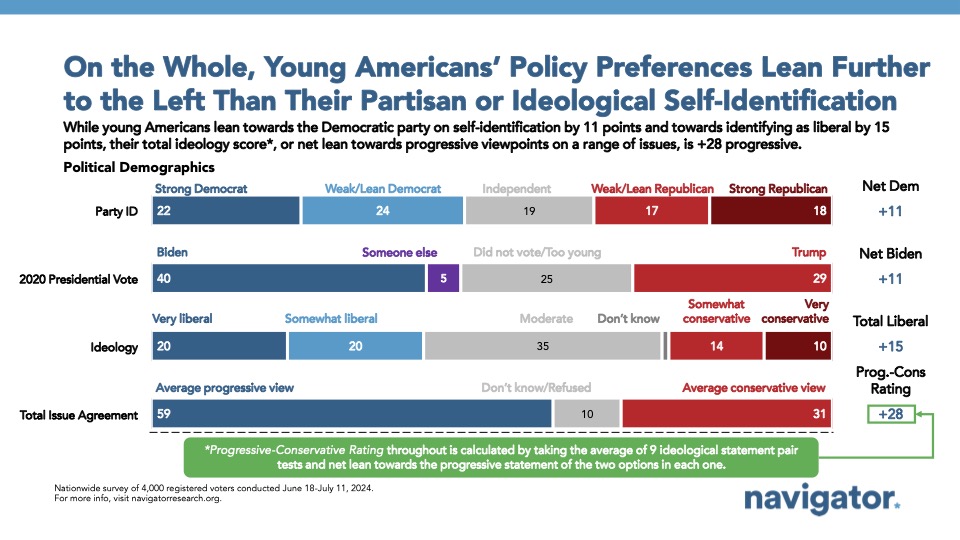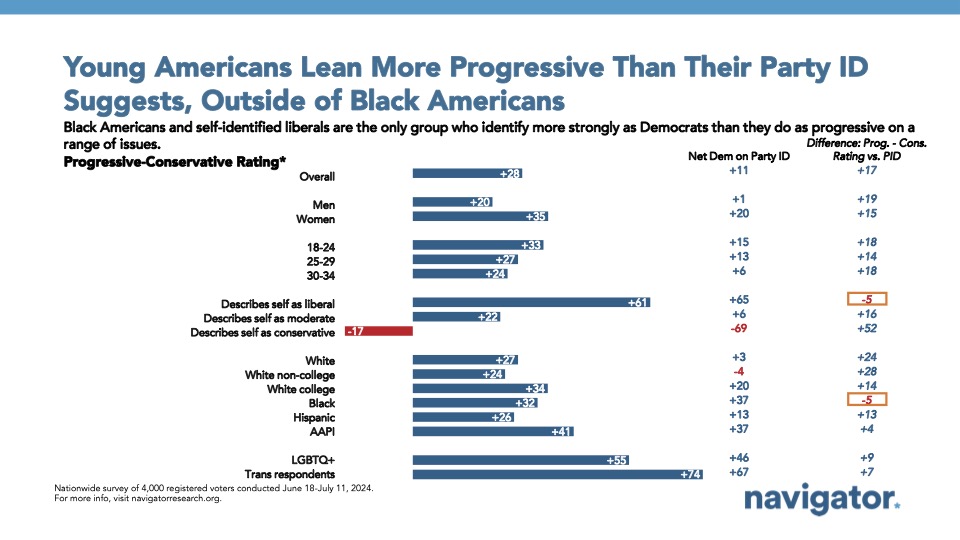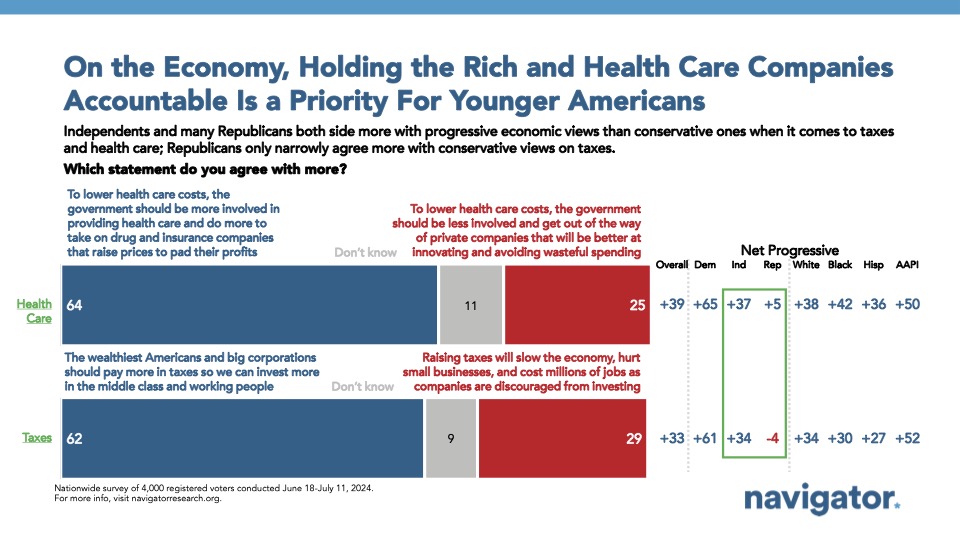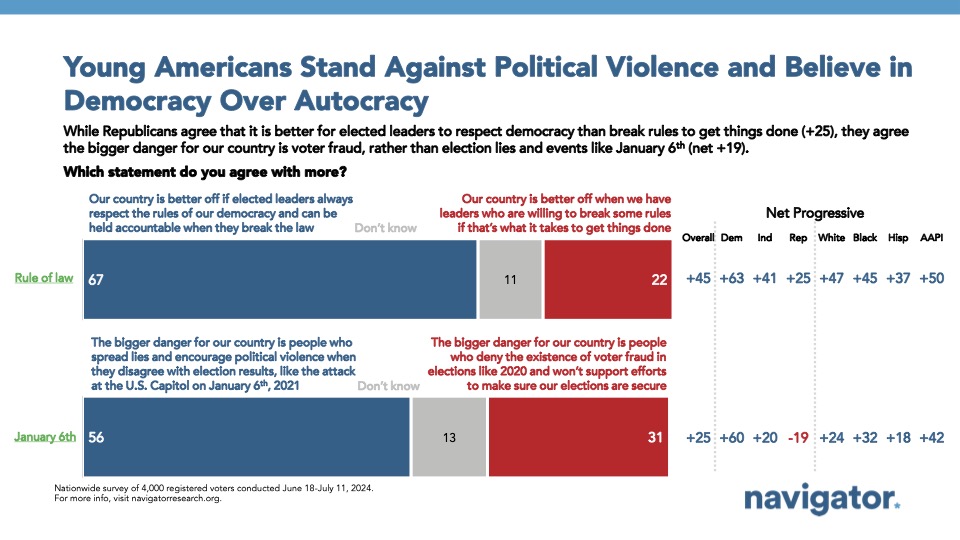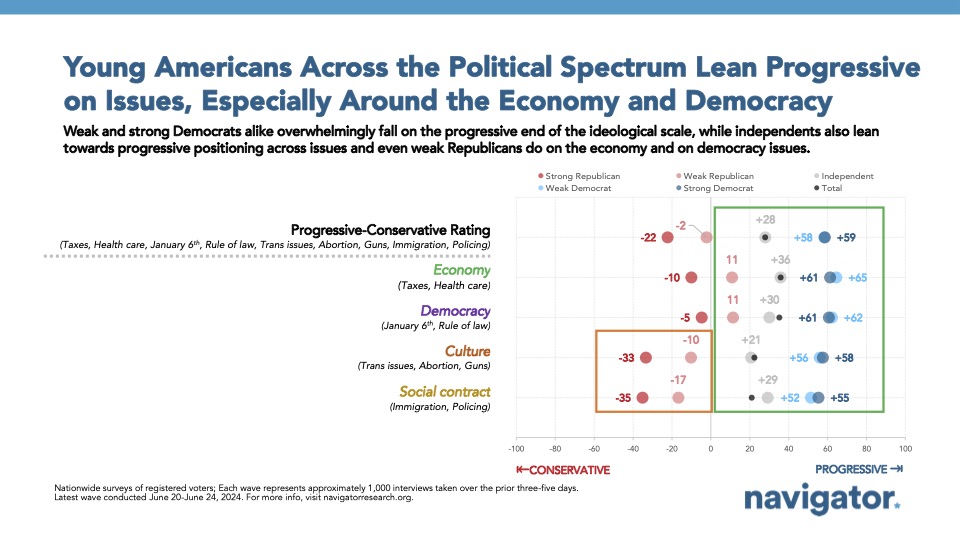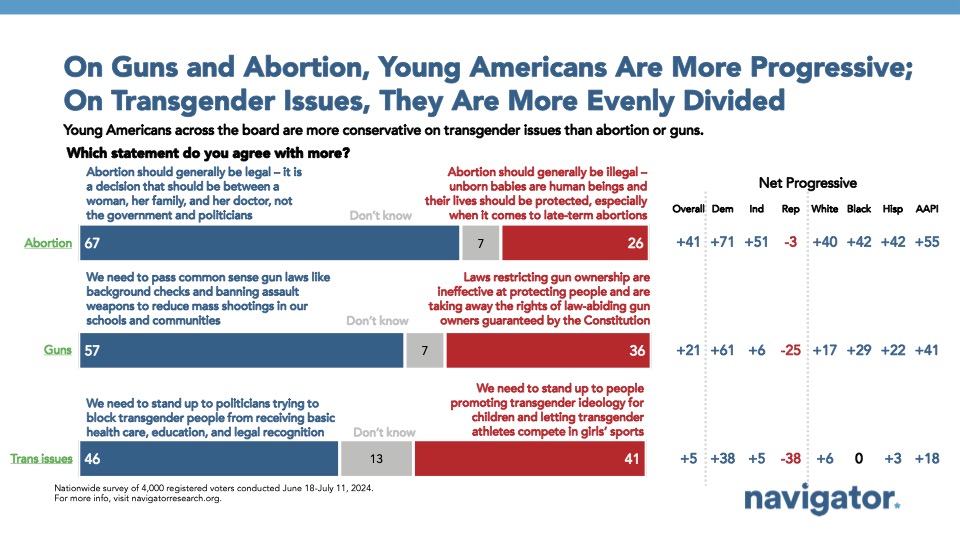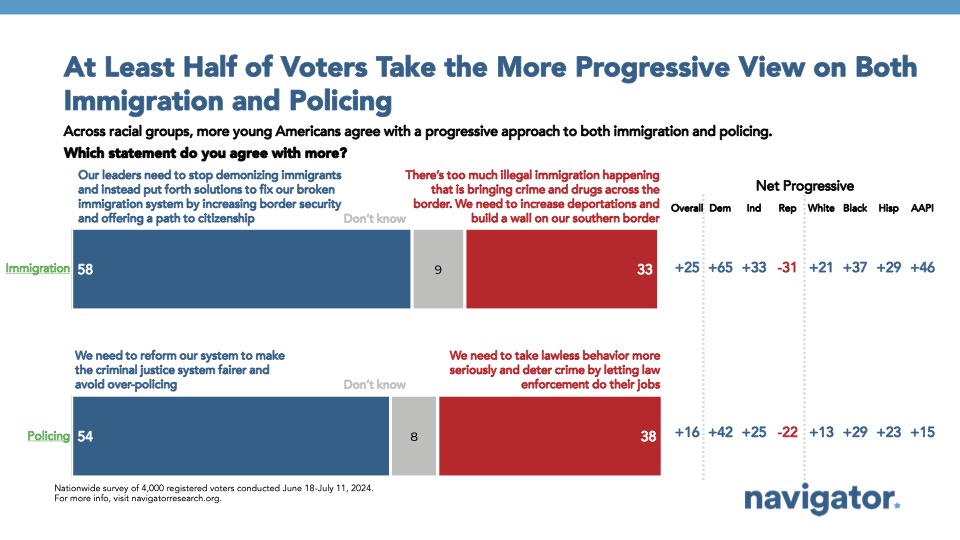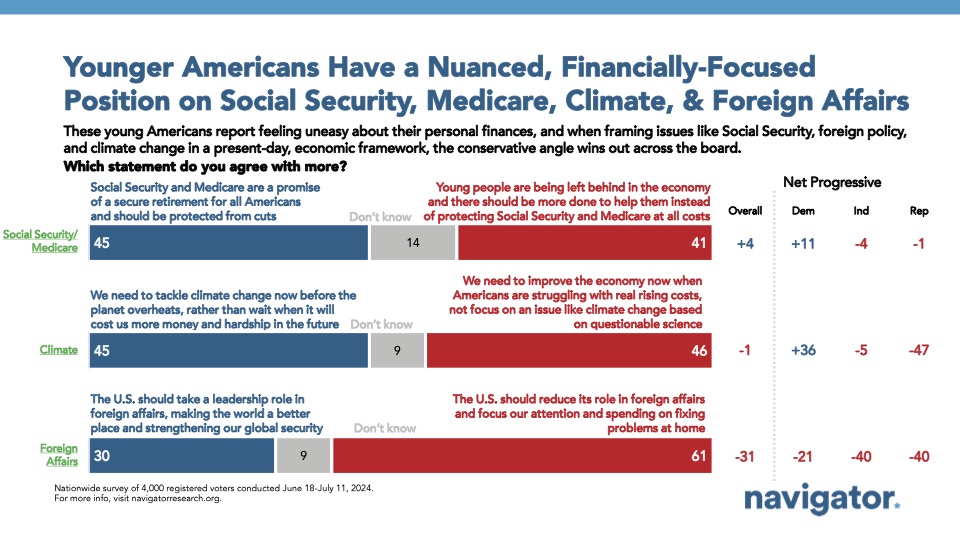Poll: Young Americans by Issue
This Navigator Research report is the fourth release from a survey conducted among 4,000 Americans under the age of 35 across five different modes to understand where they stand on issues facing the nation today. Today’s release focuses on younger Americans’ stances on a range of issues including the economy, democracy, reproductive rights, and a number of other issues, and how their political identity aligns with their issue stances.
Younger Americans’ policy preferences lean significantly more progressive than their self-reported partisanship or ideology suggests.
Respondents in this survey were asked their issue position between a more progressive statement and a more conservative statement on nine different issues facing the country today. Across all issues, the average of younger Americans agreeing with more progressive views over more conservative views won out by 28 points (59 percent average progressive view – 31 percent average conservative view), far exceeding the self-reported partisan identification advantage of leaning Democratic by 11 points (46 percent Democrats – 35 percent Republicans) and the 15-point liberal identification advantage (40 percent liberal – 25 percent conservative).
- Demographics that were even more progressive than their self-reported partisanship include younger white non-college educated Americans (on average 24 points more progressive on issue positions but 4 points more likely to self-report as being a Republican) and younger men (on average 20 points more progressive on issue positions but 1 point more likely to self-report as being a Democrat).
- The only demographics where self-reported Democratic partisan identification was higher than the average progressive view on issues were younger Black Americans (on average 32 points more progressive on issue positions but 37 points more likely to self-report as being a Democrat) and younger self-identified liberals (on average 61 points more progressive on issue positions but 65 points more likely to self-report being a Democrat).
Younger Americans align more with a range of progressive stances on health care, the economy, abortion, and democracy.
By a 39-point margin, 64 percent of young Americans agree more with the progressive health care position that the government should be doing more to provide health care and take on drug and insurance companies that raise prices compared to just 25 percent who agree more with the more conservative argument the government should be less involved in health care and get out of the way of private companies.
- On taxes, younger Americans agree more by 33 points that the wealthiest and big corporations should pay more in taxes (62 percent) rather than agree with the argument that raising taxes will hurt the economy (29 percent).
- Younger Americans also align more with progressive arguments on democracy issues: by 25 points, more agree that the bigger danger for the country is people who spread lies and encourage political violence when they disagree with election results (56 percent) than agree that the bigger danger is denying the existence of voter fraud (31 percent). By an even larger 45-point margin, 67 percent agree the country is better off if elected leaders respect the rules of our democracy compared to 22 percent who say it is okay if our elected leaders break some rules to get things done.
- Independents are more likely to agree with the average progressive view by 36 points over the average conservative view on economic issues and by 30 points more on democracy issues. Weaker Republicans are more likely to have the average progressive view on economic issues and democracy issues by 11 points.
Younger Americans are strongly progressive on issues related to abortion, immigration, and passing common sense gun laws like background checks.
By 41 points, two in three younger Americans agree that abortion should generally be legal and that it is a decision between a woman, her family, and her doctor (67 percent), while one in four believe abortion should generally be illegal (26 percent). This margin is even higher among independents (net +51; 68 percent legal – 17 percent illegal).
- By 25 points, younger Americans align with the more progressive stance on immigration that “our leaders need to stop demonizing immigrants and put forth solutions” (58 percent) over the more conservative argument that “there is too much illegal immigration happening and that we need to increase deportations and build a border wall” (33 percent).
- Nearly three in five younger Americans also believe common sense gun restrictions like background checks and banning assault weapons need to be passed (57 percent) compared to just 36 percent who say these kinds of laws are ineffective.
- A plurality of younger Americans agree with a statement that “we need to stand up to politicians trying to block transgender people from receiving basic health care, education, and legal recognition” (46 percent), but this only wins by 5 points over a more conservative statement that “we need to stand up to people promoting transgender ideology for children and letting transgender athletes compete in girls’ sports” (41 percent).
With economic anxieties high among young Americans, framing topical issues in an economic lens can divide younger Americans.
With the economy being the clear top issue for younger Americans (36 percent with jobs and the economy in top two most important issues, 26 percent with inflation in top two most important issues), and with economic sentiment deeply negative among them (net -48; 25 percent good/excellent – 73 percent poor/not so good), conservative messaging in an economic framework around issues like climate change and Social Security can divide younger Americans. They are split when presented with a progressive argument that “we need to tackle climate change now before the planet overheats, rather than wait when it will cost us more money and hardship in the future” (45 percent agree) and the more conservative position that “we need to improve the economy now when Americans are struggling with real rising costs, not focus on an issue like climate change based on questionable science” (46 percent agree). A similar dynamic plays out on the topic of Social Security and Medicare: by a 4-point margin, a narrow plurality agree more that “Social Security and Medicare are a promise of a secure retirement for all Americans and should be protected from cuts” compared to 41 percent who agree more that “young people are being left behind in the economy and there should be more done to help them instead of protecting Social Security and Medicare at all costs.”
- However, younger Americans deeply prioritize the importance of climate change and believe in protecting Social Security and Medicare. in our most recent national survey, 65 percent of those under 35 agree more that “climate change is a real threat to future generations, and we need to take action now to reduce its impact” compared to only one in four younger Americans who agree that “climate change is just a scientific theory, and there are more important problems for the government to be focused on” (25 percent). Additionally, younger Americans agree more with the progressive position by 48 points that “Social Security and Medicare are a promise of a secure retirement for all Americans and should be protected from cuts” (69 percent) compared to only 21 percent who agree that “Social Security and Medicare are unsustainable in their current form, and we need to cut or privatize the programs to secure their future.”

